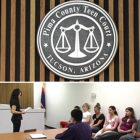
OP-ED: In Illinois, a Season of Restorative Justice
|
Judge Timberlake discusses the importance of restorative justice, as well the practice's future and challenges.
Juvenile Justice Information Exchange (https://jjie.org/page/333/)

In late September, Torri was driving down the highway with her 11-year-old son Junior in the back seat when her phone started ringing.
It was the Hamilton County Sheriff’s deputy who worked at Junior’s middle school in Chattanooga, Tennessee. Deputy Arthur Richardson asked Torri where she was. She told him she was on the way to a family birthday dinner at LongHorn Steakhouse.
“He said, ‘Is Junior with you?’” Torri recalled.
Earlier that day, Junior had been accused by other students of making a threat against the school. When Torri had come to pick him up, she’d spoken with Richardson and with administrators, who’d told her he was allowed to return to class the next day. The principal had said she would carry out an investigation then. ProPublica and WPLN are using a nickname for Junior and not including Torri’s last name at the family’s request, to prevent him from being identifiable.
When Richardson called her in the car, Torri immediately felt uneasy. He didn’t say much before hanging up, and she thought about turning around to go home. But she kept driving. When they walked into the restaurant, Torri watched as Junior happily greeted his family.
Soon her phone rang again. It was the deputy. He said he was outside in the strip mall’s parking lot and needed to talk to Junior. Torri called Junior’s stepdad, Kevin Boyer, for extra support, putting him on speaker as she went outside to talk to Richardson. She left Junior with the family, wanting to protect her son for as long as she could ...

Judge Timberlake discusses the importance of restorative justice, as well the practice's future and challenges.

A report released by the American Civil Liberties Union (ACLU) earlier this week found that in 2010, African-Americans were approximately four times more likely than whites to be arrested for marijuana possession -- this, despite that fact that national data indicates the two populations use marijuana at nearly the same rates. Furthermore, in several states, including Illinois, Iowa and Minnesota, the ACLU said African-Americans were busted for pot at rates from 7.5 to 8 times higher than whites. Regardless of region, the ACLU reports that these discrepancies in arrest rate by race remain consistent. “In over 96 percent of counties with more than 30,000 people in which at least 2 percent of the residents are black,” the report reads, “blacks are arrested at higher rates than whites for marijuana possession.”
Overall, New York, Texas, California, Florida and Illinois were found to have the highest rates of marijuana possession arrests. In almost half of all states, the ACLU found that possession offenses accounted for more than 90 percent of marijuana arrests.

The Supreme Court of Mass. shoots down a petitioner’s claim that a state law forbidding the issuance of firearm permits to individuals with juvenile felony records was unconstitutional.

While the majority of youth offenders are male, the nation’s juvenile justice system is dealing with more and more girls. In 2010, girls made up 29 percent of all juvenile arrests nationwide.
Aging Out: Life After Foster Care from Lindsay Armstrong on Vimeo. NEW YORK -- When Cordale Manning came to live with Elaine and Lee Fair at age 17, he was on his fourth foster home in as many years. The Fairs had a simple philosophy: as soon as a child entered their home, he or she became family. After countless family dinners, long conversations and moments of shared laughter, Manning started to believe them. However, a small voice still nagged in his mind. He worried that at 21, the age of independence, the Fairs would let him go and he would be alone.

Nebraska’s juvenile justice system will have a new focus on rehabilitation thanks to a bill signed into law Wednesday by Gov. Dave Heineman. Legislative Bill 561 (LB561), introduced by state Sen. Brad Ashford (I-Omaha), will allocate $14.5 million towards several new services, as well as a grant program to aid counties in treating juvenile offenders. The bill decreases the state’s dependency on juvenile detention programming, placing a greater emphasis on youth rehabilitation. The new measure also transfers juvenile offender supervision over to Nebraska’s Office of Probation Administration, which is subordinate to the state’s Supreme Court. Prior to the legislation taking effect, Nebraska’s juvenile populations were instead overseen by the state’s Department of Health and Human Services.

I think I first heard the phrase “people over process” a few years ago in Illinois. I was in a room with a hundred or so people, studying Restorative Circles, and most of us were intently focused on the mechanics of the process. A participant in a practice circle did something that wasn’t on the “script”, and it threw us (or at least me) into a tizzy. Dominic Barter, the developer of the process, said that given a choice between following the process or the person, choose the person. That stuck with me, and I have applied it in all sorts of settings since, and I notice when it isn’t applied to me.

An OJJDP-sponsored webinar last week discussed the merits of youth courts as an alternative school disciplinary approach.